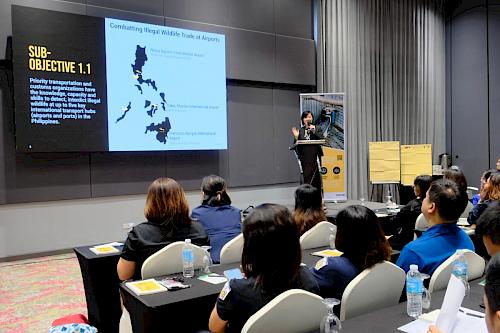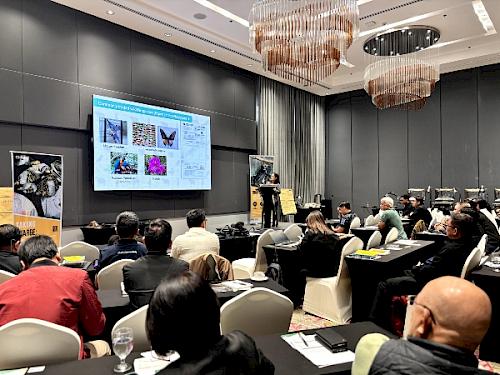Wildlife Trafficking Detection and Collaboration Elevated at Manila Air and Sea Ports
TRAFFIC and the Philippine Bureau of Customs (BOC) have kick started an effort that will eventually see dozens of enforcement officers equipped with the skills to train thousands more across the country to fight wildlife crime at its transport hubs.
 Eight of these officers, selected from among participants of a Training of Trainers session in January, have already had the opportunity to test their skills at two workshops on combatting illegal wildlife trade at airports and seaports in Manila earlier this month.
Eight of these officers, selected from among participants of a Training of Trainers session in January, have already had the opportunity to test their skills at two workshops on combatting illegal wildlife trade at airports and seaports in Manila earlier this month.
Airports and seaports in the Philippines are frequent points for trafficking wildlife into and out of the country.
Most recently, in May 2024, the BOC intercepted a parcel containing scorpions and isopods bound for Mexico at the Ninoy Aquino International Airport that had been falsely declared as a “traditional designed shoulder bag”.
These transport hubs also face significant enforcement challenges as they service an archipelagic nation of over 7,000 islands with an estimated 11,000 native plant and animal species, including more than 6,000 species that are endemic.
The June workshops in Manila for airport and seaport officers are part of efforts to strengthen law enforcement under the Taking Charge: Strengthening Criminal Justice Response to Wildlife Crime in the Philippines* project.
Using tried-and-tested course material and methods tailored for entry and exit points, it aims to upskill identification, inspection and interdiction of illegal wildlife products smuggled in passenger luggage and cargo.
“This activity supports us to create a sustainable training model, ensuring awareness and capacity building for the harmonized and effective wildlife trafficking interdiction nationwide”, said Senior Police Lieutenant Elvin Enad, Officer in Charge, Environmental Protection and Compliance Division, Bureau of Customs.
 The workshops in June also aimed to promote cooperation between the government and the private sector in wildlife crime prevention.
The workshops in June also aimed to promote cooperation between the government and the private sector in wildlife crime prevention.
Officers from eight government agencies and seven private sector representatives came together to learn about policies and legislations protecting wildlife, law enforcement protocols, export and import documentations, identification of commonly traded species, common smuggling techniques, to communications and financial data to track criminal networks.
Government agencies that attended included Bureau of Customs, Office of Transportation Security, Manila International Airport Authority, Philippine National Police -Aviation Security Group and Maritime Group, Philippine Ports Authority, Philippine Coast Guard, and the Department of Justice National Prosecution Service.
Meanwhile critical private sector stakeholders involved were the Airlines Operators Council representatives from Cebu Pacific, KLM, and Emirates. They were joined by the Philippine Postal Corporation, which is a government owned corporation.
All stakeholders were either stationed at the Ninoy Aquino International Airport and the Port of Manila (North and South Harbour) which carries about 31 million human passengers and handles approximately 250 MMT of cargo volume and 7 million TEUs annually.
Participants mapped process flows at these transportation hubs and identify gaps in detecting and interdicting wildlife smuggling.
Mr. Edgar Allan Nepomuceno, Airlines Operations Councill Chairman noted, "This training is a valuable opportunity to learn more about the illegal wildlife trade and allows us to engage directly with the government agencies in a different setting. The training provided practical know-how and further encourages us to relay valuable information to our people on the ground.
Similar training at the airports in Cebu and Davao and the seaport in Palawan are planned in the upcoming months.
Notes:
The Taking Charge: Strengthening Criminal Justice Response to Wildlife Crime in the Philippines is aimed at strengthening Philippine law enforcement agencies’ capacity to tackle wildlife crime and is funded by the United States Department of State Bureau of International Narcotics and Law Enforcement Affairs.





